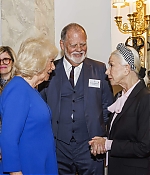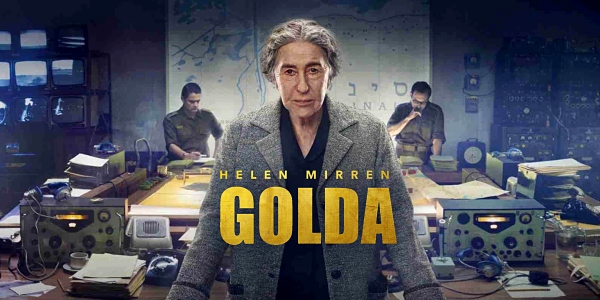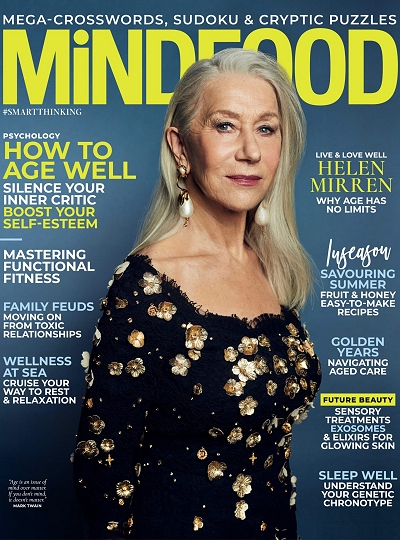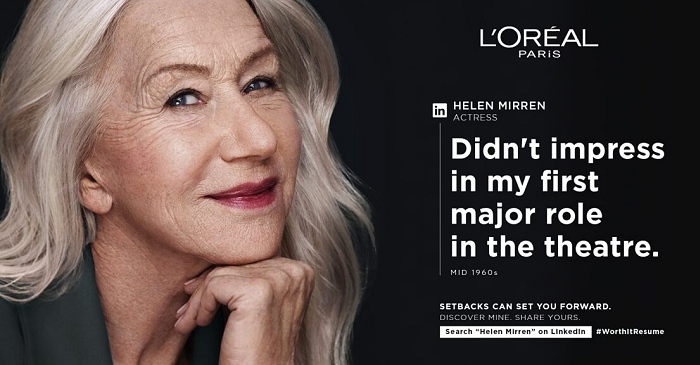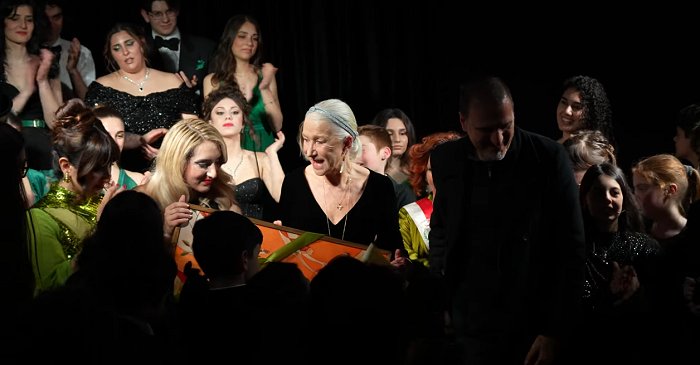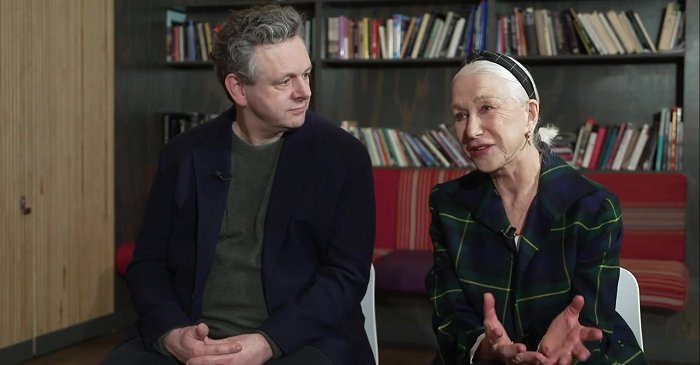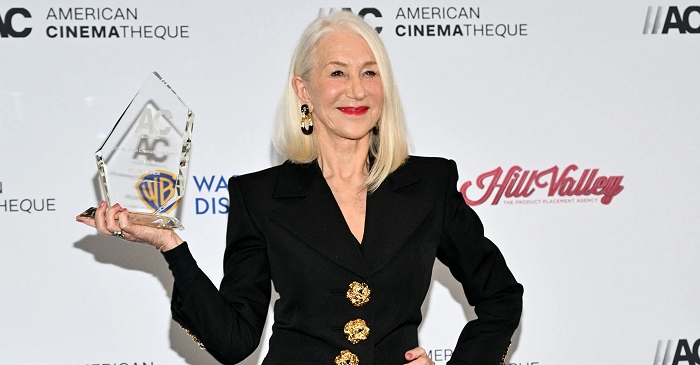
|
Welcome to The Helen Mirren Archives, your premiere web resource on the British actress. Best known for her performances with the Royal Shakespeare Company, "Prime
Suspect" and her Oscar-winning role in "The Queen", Helen Mirren is one of the world's most eminent actors today. This unofficial fansite provides you with all latest
news, photos and videos on her past and present projects. Enjoy your stay.
|
Celebrating
10 years
on the web
|
From sex symbol to prime suspect to Oscar-winning acting royalty, Helen Mirren’s career is a miracle of reinvention. As she reunites with Donald Sutherland for golden oldie road movie The Leisure Seeker, the 72-year-old Oscar-winner proves she’s far from on the road with Donald Sutherland in upcoming The Leisure Seeker.
YOU HAVE TO BE VAIN AND EGOTISTICAL, OTHERWISE YOU CAN’T OPERATE AND CAN’T DO IT. ON THE OTHER HAND, IT CAN GET HORRIBLY OUT OF CONTROL.
Helen Mirren is looking relaxed, and so she should be. “I’ve just spent two months doing nothing at all,” she says, breezily. It’s early September, and Mirren has just enjoyed the summer off with Taylor Hackford, her filmmaker husband of 20 years (although they first met when he directed her in 1985’s Soviet-era tale White Nights). Not that, at 72, she’s about to apologise for taking an extended break. “I’m lazy,” she trills. “I’m lazy by nature.” Still, after five decades of theatre, television and film, it’s hard to accuse Mirren of indolence. Chattering away in a secluded Venetian garden, she’s full of enthusiasm for her latest project, Paolo Virzì’s The Leisure Seeker. Co-starring Donald Sutherland, it’s an RV-set road movie tinged with tragedy as long-term married couple Ella and John make a pilgrimage to the Florida Keys under the shadow of illness. Think the antidote to the Marigold Hotel movies: caustic, real and bitterly funny. Moreover, Mirren’s lust for acting has been with her forever. As critic David Thomson once said, “Helen Mirren is so hard-working it is tempting to take her for granted.” After being invited to join the Royal Shakespeare Company in the late ’60s, she gradually moved into film on projects such as John Boorman’s Excalibur (with her ex, Liam Neeson) and, cultivating a pin-up reputation, Caligula and The Cook, The Thief, His Wife & Her Lover.
Since then, she’s defied the Hollywood wisdom that most actresses are discarded in their thirties (“That’s a myth,” she says). First, there was the groundbreaking Prime Suspect, with Mirren playing the Lynda La Plante-created police detective Jane Tennison across seven miniseries (from 1991 to 2006). The first three outings alone won Mirren back-toback-to-back Baftas.
Then there are the royals. Dame Helen Mirren, as she became in 2003, has done rather well out of playing our monarchs. In The Madness Of King George, she was King George III’s wife Queen Charlotte (winning her the first of four Oscar nominations). She played the title role in a two-part miniseries Elizabeth I. And then, in 2006, came the career-definer: Stephen Frears’ The Queen, a brilliantly human portrayal of Queen Elizabeth II in the wake of Princess Diana’s death. It sent her into the stratosphere. A Best Actress win at the Venice Film Festival set the tone for a year of Mirren-worship: the Oscar, the Bafta, the Golden Globe, the Screen Actors Guild Award all followed (in fact, she received two Globes and two SAGs, with her work on Elizabeth I also celebrated). The irony was not lost on Mirren, whose maternal grandfather had been butcher to Queen Victoria while her paternal equivalent was a Russian soldier and diplomat. To look at her now, Mirren could easily be regarded as no longer a rebel-rouser. “That’s my great fear,” she says. “I don’t want to be part of the establishment.” It’s why she keeps on mixing it up at work. Jason Statham’s mum in Fast & Furious 8, a haunted widow in the recently released Winchester and, to come, Luc Besson’s new crime thriller Anna. No, Dame Helen… lazy you are not.
Last year you played Death in Collateral Beauty and now in The Leisure Seeker you’re staring at the topic full on…
Yes, are they trying to tell me something?
Maybe so, but is it a subject that fascinates you?
Well, it’s a part of life, isn’t it? It’s as much a part of life as anything else we do. We are all headed in that direction, sorry to tell you! It’s gonna happen. So one might as well confront it, and what better time to confront it than the latter part of your life. As you travel through life, you do realise that you lose friends and colleagues and death becomes a part of your life and that happens at every age. It’s not just what happens to older people.
What was your reaction when you read the script?
I liked it very much. I loved the character of Ella. I loved her exuberance and her vocalness and her positivity. But I wanted to watch Paolo’s work. I wasn’t hugely familiar with it. I’d heard of him. So I watched Human Capital, which I loved. And that was what made me want to do the movie. I thought if he can bring that kind of sensibility, that delicate touch of comedy and drama and tragedy, that’s exactly what this movie needs.
Was working with Donald Sutherland a big attraction?
I had worked with Donald a long time ago [on 1990’s Bethune: The Making Of A Hero]. A long time ago. Hadn’t seen him since. Hadn’t even had dinner with him or a phone conversation or anything. So he’d gone his way and I’d gone mine for 20-odd years and now we’re making this movie and now we have to look as if we’re a married couple who’ve spent the last 20 years together. But actors are quite good at that. Both actors understand what is required. We have to create this illusion of an intimate relationship. He’s a very experienced actor. I’m a very experienced actress. So we know how to do that. But also we know that it’s essential, you can’t avoid it.
Did you have any hesitation about taking on the role?
No, I don’t think so. I don’t remember any hesitation. I was a bit nervous about the sex scene. I didn’t really want to do that. But, no, absolutely not.
Isn’t it quite progressive to see older people in a sex scene?
Yes it is, and Donald was great, in fact. He sort of took charge, if you like, of the situation!
Why were you nervous?
Oh, I don’t know. I always hated doing sex scenes anyway. Every part of my life. I’ve never particularly enjoyed that. So I didn’t particularly want to do that, but it was fine.
A lot of your early roles – Caligula, The Cook, The Thief, His Wife & Her Lover – did help engineer a reputation as a sex symbol. How did that make you feel?
Honestly, I just don’t think about that. I’ve never seen myself as a so-called sex symbol. I didn’t then. And I don’t now. I’ve always just let other people get on with that – the audience, the publicists, the journalists. It’s not my business, if you know what I mean. I just do what I do. I do it the best I can. I do my job and I get on with it.
What about the reaction to that more recent shot of you wearing the red bikini on the beach?
Yes, but I was in private. I was very much in private. And I was papped. That’s fine. It’s the name of the game. But I wasn’t posing on the beach in Cannes! Ironically, funnily enough, I was in Puglia with my husband. We’d climbed over rocks and cactus and got through brambles to get to a completely private place – not because we were seeking privacy from paparazzi. We just like swimming in places where there aren’t other people. It’s just very difficult to find a spot like that. It was unbelievable that this guy [took that photo]… but literally a week before I’d been on a beach in Cannes with my sister, one of those beaches where you go and you pay and lie with 20,000 other people, and not a single person took a photo of me! I’m sitting there completely with the public. It’s funny.
Paparazzi aside, has it got worse in the age of camera phones?
Well… there used to be an understanding of privacy. There is no understanding of privacy. Privacy is completely gone. Random people taking photos, emails being hacked, people doing screen grabs whatever. It used to be if you did a nude scene, for example, closed set, no photography. Now they do a screen shot from the movie, put it on the internet, for everybody to see. So on a simplistic level like that but on so many more levels… there is no privacy for any of us anymore.
Has technology affected your profession in other ways?
Oh, massively and it will continue to affect it. Obviously the whole way of watching movies has changed and is in the process of an enormous sea change. It’s devastating for people like my husband, film directors, because they want their movies to be watched in a cinema with a group of people. So it’s a communal thing. An audience, a movie, and you’re all in it together… you’re frightened, you laugh, you cry all together. So it’s a communal thing. And that’s beginning to disappear.
So you dare not watch a film on your phone at home?
Oh, no! Actually, I don’t want to watch a movie on my phone at home either. I’ll watch it on my iPad. My iPad Pro! But I prefer to watch it in a beautiful cinema with amazing sound. So, yes, it’s changing rapidly and that change will continue.
Thinking back to your youth, did you become the person you wanted to be?
Well, the thing is, I think when you’re younger, you don’t really grasp what the possibilities of the way to be are, if you know what I mean. You’re so confused in your sense of identity and ego and insecurity and shyness – who am I going to be? It’s very difficult when you’re young to have a clear idea of the person you want to be. But if my young self were standing next to me, I would say, “Don’t worry, it’ll be fine.”
Did life surprise you?
Well, I was ambitious as a young actress. I wanted success without a doubt. I wanted my voice heard as an actor. I wanted my art to be recognised and all the rest of it. But I had no idea whether that was going to happen or not. You don’t. Life is an unknown. It’s funny. When I was going through a period of great insecurity and fear about the future, I went to have my palm read because I wanted to be reassured. Don’t worry Helen, you will be very successful!
I was in my early twenties – 21 or 22. And I just wanted to be told that I’d be successful, and I went to this palm reader, and he said, “Take some paper and pencil and write it down, because I will speak very fast and you won’t remember what I’ve said.” So he took my palm, and he started talking and I started writing it down… after 20 minutes, I had this sheaf of paper and he said, “OK, that’s it, I’ve done it.” And I walked out, and I couldn’t remember what I’d written down. I had no idea. And there on the paper was my future, but it was all in there somewhere. I looked at it and thought, “You know what? I don’t want to know.” And I found the nearest rubbish bin and I threw it away, because I realised that I wanted life to be an adventure. I didn’t want to know what was going to happen. I wanted it all to come as a surprise. I thought how boring to know what’s going to happen. That’s horrible. I want to make my mistakes.
One of your earliest memorable roles was in The Long Good Friday. Did playing a gangster’s moll gain you some kudos among, shall we say, shadier types?
Certainly in the East End. In fact, my mother’s side of the family did come from the East End. And actually I’d had an uncle – not a blood relative, but an uncle by marriage – who was an East End gangster. So I’d had tenuous connections with that world anyway. But certainly, for a long time afterwards, I had incredible credibility in the East End. Any East End pub I went into, any taxi driver, I had great cred.
In 1991, you played DCI Jane Tennison for the first time in Prime Suspect. The character became iconic as you revisited her over the years. What did she come to represent?
She certainly spoke to a whole generation of successful and economically powerful women. They were a market who’d been ignored. They could buy big Mercedes and expensive mortgages and pensions and were a success in the workplace, but nobody had ever shown what it had been like for them to get there. Prime Suspect showed that. Instead of being a victim, Tennison barrelled her way through – as those women did in real life – without whining or going to tribunals.
Would you consider television again?
I’ve been asked to do a couple of TV series. But I’m very wary. I hate the feeling of being trapped, having to do something. That is very… I don’t really like that feeling, but maybe if something comes along that is spectacular, maybe I will do it.
You were one of many in Robert Altman’s Gosford Park, which gained you a second Oscar nod after The Madness Of King George. What attracted you to it?
Just the idea of Bob Altman’s history and culture coming into my culture… I love it when the two cultures clash, bounce off each other. Just the thought of this quintessential American film director making the quintessential English – not even British, but English – film, I thought was a very interesting idea.
In 2006, you took on arguably your most famous film role – Queen Elizabeth II – in Stephen Frears’ The Queen. How did it come about?
I always forget how these things happen. I know that Andy [Harries, producer] had the idea when we were doing the first read-through of the last Prime Suspect, and he looked at me and thought, “Actually, she looks a bit like the Queen.” And then he came to me and said, “I’m thinking of doing a thing on the Queen with Stephen and Peter Morgan – are you interested?” I said, “Yes – but it very much depends on the script.” And then Peter went away and wrote this extraordinary script that I thought was really wonderful, moving and funny. It was beautifully placed – it wasn’t grovelling or unfairly attacking. I thought it was humanising.
Did the role hold any fears for you?
I was very intimidated. I was more nervous of this than anything I’ve ever done. For all those reasons – you know the press is going to be on it. It’s going to be exposed and looked at in minute detail. Also, the responsibility of having to recreate someone who is so familiar to us all. I’m not a very good mimic. That’s not my forte at all – doing accents and stuff – so the impersonation side of the responsibility was quite intimidating too.
You’ve been nominated four times, but what did winning the Oscar for The Queen represent to you?
What did that represent? It was like being in a… you know sometimes you dream that you can fly? Have you ever dreamt that you can fly? I dream that I can levitate. I’m standing, and then I suddenly just go up, and I’m up on the ceiling looking down, and I’m saying to everyone, “It’s easy! You just think and then you go up.” It’s always a lovely dream. And winning the Oscar was a bit like that – a bit like dreaming I could levitate.
Do awards mean much to you?
Prizes are wonderful but unimportant. They live in a weird little world, where they’re wonderful and yet not. I don’t know, it’s hard. You can’t think about that in my job.
Aside from the royals, you’ve played a lot of real people: in Hitchcock, Trumbo and Woman In Gold to name but three. Do you like testing yourself in this way?
Well, you’re always testing yourself. Yes of course. The jobs that you sign up for are always the ones that scare the shit out of you. Oh, I can’t do that – that’s much too scary! So you say, “Obviously that’s what I have to do.”
You had a lot of options after The Queen, not least delving into out-and-out comedy with the remake of Arthur with Russell Brand. How was he?
He’s limitless. He’s just so brilliant. His brain works so fast. Talk about the tortoise and the hare. I felt like this galumphing, mentally slow person. He couldn’t be kinder and more generous. It was not like he was making me feel bad. Not at all. It was the opposite. He was incredibly welcoming and appreciative. But he is just so brilliant that you just feel like an idiot.
More recently, you had a great run in spectacular action movies such as Fast & Furious 8 and the RED films. Was that a hankering you had?
It was a little hankering definitely. Absolutely it was.
Did you have to do much to make those roles happen?
I begged! I put it out there and then I begged. That was one of the wonderful advantages of winning an Oscar. I got to be in action movies! Because they love having Oscar-winners in their action movies! They want to bring you down!
Was it as much fun as you’d hoped?
Yes, more! More fun. Especially the action sequences, they’re the best. I love them. And the technology. They’re extraordinary, these special effects guys and stunt guys. To watch those craftsmen at work… There really should be an Oscar for stunt work. There should be. These guys are incredible and they’re so careful and they’re so professional. And they’re artists. They do amazing things.
You also played opposite Al Pacino in Phil Spector, the David Mamet film about the infamous record producer. How was it working with Pacino?
What do you think? He’s brilliant! Absolutely brilliant. I have to say, I’ve had a few pinnacles of my career, and one of them is working with and watching Al work. He’s just incredible. He’s just the archetypal total actor. He loves acting. He loves actors. He’s incredibly supportive of his fellow actors. I think he’s gone through something and he’s come out somewhere really incredible.
Was this your first time with him?
Yes, but I’d met him before. Actually, he threw me off a set once! Which I completely understood, I have to say. My husband directed The Devil’s Advocate and he said, “You should come in today because Al’s doing his big last scene and it’s going to be fantastic. I just know he’s going to be brilliant.” Because he’s an incredible improviser, Al. “So why don’t you come?” And I said, “I’d love to see that.” And my husband added, “Just be quiet and stay behind everybody.”
So I crept on, behind the whole set, and there were hundreds of people between me and Al. And he could see me, and then I saw him talk to Taylor, and Taylor came over to me and said, “I’m sorry Helen, I’m afraid you’re going to have to leave the set.” I said, “Absolutely, I understand.” And I knew why, and I would’ve done the same. It’s a weird thing as an actor. You don’t like being looked at. You don’t like being watched. And because I was an actress, and because I was an actress that he respected, he didn’t want me there. All the crew, the make-up people, anyone involved in the film, fine. But not her! So when I met him this time I said, “Al, this is one set you can’t throw me off!”
What are you like on set?
I always like to get to the set early. Some people always like to get to the set late. I always like to be there before they’re ready, so I can watch what’s going on and get a sense of what the shot is, what the problems might be. So I like to get there early.
You’re next up in The Nutcracker And The Four Realms, directed by Lasse Hallström, who you worked with on The Hundred-Foot Journey. What can you tell us?
It’s basically the Nutcracker story, as an enormous, amazing fantasy – a wonderful Disney film. The opposite of what one thinks of Lasse doing; he’s known for these very intimate, personal human little stories, which he does so beautifully. I think that’s why they wanted him to do it.
Do you get sentimental about your career? Do you keep things?
I’m not very good at keeping things. My mum used to keep things, thank God, so when I eventually got to do a book, I had all this stuff. I didn’t keep anything. I’m not very good at keeping things. No, I’m not very sentimental actually. I want to get rid of it all. I find it depressing!
What is the dark side of your job?
The dark side? I guess ego. Ego, and using ego in the right way. Yet when it gets out of control… handling ego and vanity. You have to be vain and egotistical, otherwise you can’t operate and can’t do it. On the other hand, it can get horribly out of control. I think it’s handling that maybe.
You’ve successfully managed to keep getting roles as you’ve got older. But are you one of the exceptions? Is Hollywood still guilty of discarding most actresses after their mid-thirties?
I’ve been very lucky. When you look at the top actresses now, all of them are around 40. All of the ones you think of as young – Kate Winslet, Jessica Chastain, Nicole Kidman… they’re all around 40, maybe 45. So it’s not the case anymore. There are more roles for men. This is true. I hope that will change. It is changing already. I’ve always said, “Don’t worry about roles for women in drama. Worry about them in life.” And as night follows day, the more roles there are for women in life – politics, business – there will be more roles for women in drama.
The Leisure seeker opens on 4 May.

